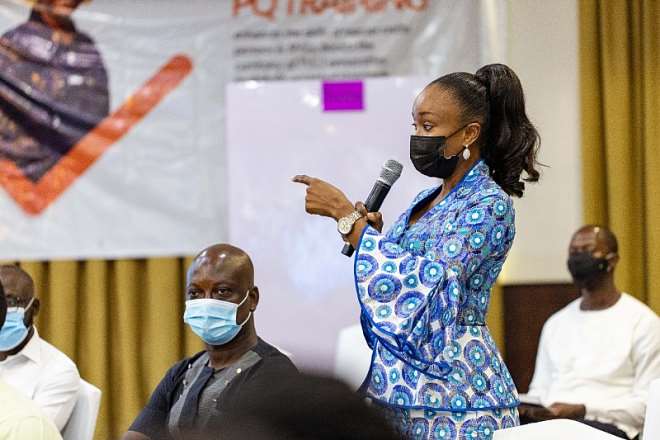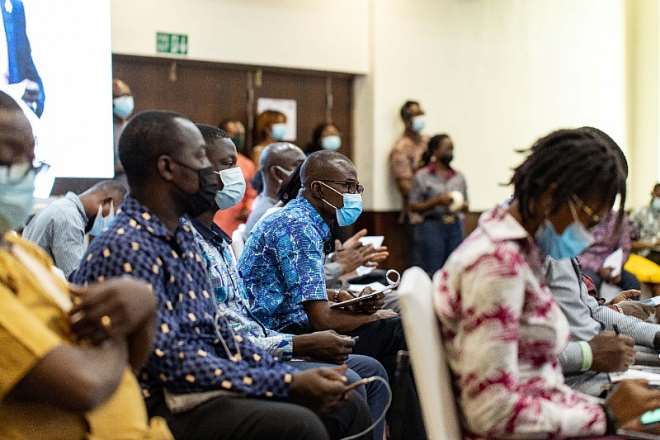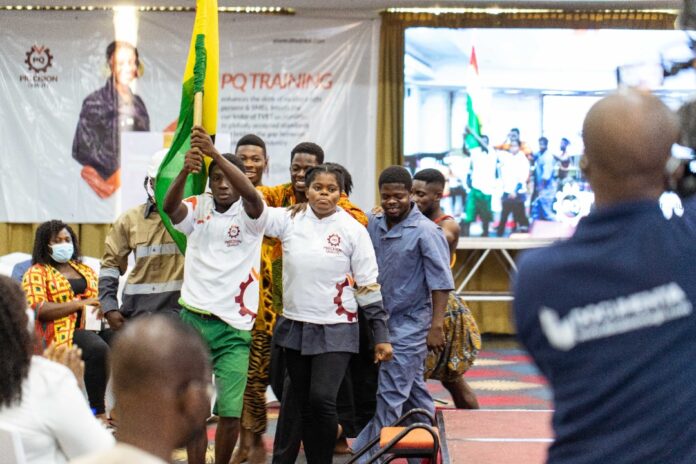Accra, February 11, 2021 –The Design and Technology Institute (DTI) has launched the Precision Quality training programme, PQ, for the effective integration of young people into the world of work.
The precision quality training programme was designed and developed in partnership with industry experts and has been accredited by the Commission for Technical and Vocational Education Training (COTVET).
The PQ programme forms part of DTI’s partnership agreement with the MasterCard Foundation. Under this agreement, 40,000 direct and indirect work opportunities and jobs will be created for young people within the next three years. it will be carried out through the “Transforming youth TVET livelihoods for sustainable jobs” intervention project under the Mastercard Foundation’s “Young Africa Works, (YAW)” initiative.
The project will provide training to 1000 youth in precision fabrication. It will enhance the Competency-based learning of selected Technical Universities in TVET training to reach 5000 students. Furthermore, it will train 5000 Master Craft Persons (MCPs)in precision quality as well as 1000 Small and Medium Scale Enterprises (SMEs) to improve their work skills and practices to meet global industry standards.
At the Technical Universities, the PQ curriculum, will through the Competency-based learning TVET training, equip young people with industry demand skills. In addition, it positions Master Craft Persons (MCPs) and SMEs to operate their businesses in an organized, safe and healthy environment for growth, providing opportunities for training and career progression and creating more jobs.
PQ training consists of five training modules: Change to grow, process integration, people and team development, health and safety in the workplace, and managing quality and customer relations.
Speaking at the workshop, the Chief Executive Officer (CEO) of DTI, Ms. Constance Elizabeth Swaniker emphasized the need for the development of effective policies that will facilitate the transition of young people from education and training to work, and for Academia, Industry, Policymakers and the artisan’s communities to work as a team for the implementation of these policies.
She reiterated DTI’s commitment to continue to develop programmes that will set its students apart in industry and business as well as create jobs for the youth. According to her, solving the issue of youth unemployment on the African continent is key to poverty reduction. “It is possible to eradicate poverty, not as a dream, but because we have the right tools and materials to achieve that,” she added.
Professor Ben Q. Honyenuga, Vice-Chancellor of Ho Technical University, the guest of honour, in his remarks about the programme stated, that “TVET and skills training is the future for economic growth in Ghana and Africa because of its employment potential. He urged stakeholders in academia to partner institutions like DTI to develop programmes that support employment creation for the youth.
He also appealed to stakeholders in TVET to “focus on developing quality educational programmes to equip the youth with the right skills and create the enabling environment for them to set up their own businesses. He believes that the youth can be positioned to lead the economic recovery process in Ghana and Africa as a whole and to leverage technology to connect with the market and expand it.”
Government officials, regulators in TVET, private sector organizations, educational institutions, civil society, development partners attended the event. It was streamed online in adherence to the COVID-19 protocols to protect lives and property.
About Design and Technology Institute
The Design and Technology Institute (DTI) is a state of the art Technical and Vocational Education Training (TVET) for young people. It was officially launched in September 2019 to provide the platform for students from various Universities, Polytechnics, Technical and Vocational Institutions to gain industry experience by working closely with artisans on a factory floor, supported by experienced instructors. The mission of the Institute is to transform skills training for young people in Ghana and across West Africa.
The Institute offers scholarships to needy but brilliant students in partnership with the MasterCard Foundation under the Young Africa Works strategy. The campus is located at Mempeasem, East Legon behind Ghana Meteorological Agency (Digital Address: GA-484-6124).
About MasterCard Foundation, www.mastercardfdn.org
The Mastercard Foundation works with visionary organizations to enable young people in Africa and in Indigenous communities in Canada to access dignified and fulfilling work. It is one of the largest, private foundations in the world. Its mission is to advance learning and to promote financial inclusion for an inclusive and equitable world. The Foundation was created by Mastercard in 2006 as an independent organization with its own Board of Directors and management.
About the Young Africa Works Programme
Young Africa Works is the Mastercard Foundation’s strategy to enable 30 million young people, including young women across Africa access dignified and fulfilling work. It is estimated that by 2030, Africa will be home to the world’s largest workforce, with 375 million young people entering the labour market. With the right skills, these young people will improve their lives and the lives of their communities, contributing to Africa’s overall competitiveness.
The Mastercard Foundation will implement the Young Africa Works programme in 10 African countries in collaboration with governments, the private sector, business leaders, educators, and the youth. Countries identified in the first phase by the Mastercard Foundation include Rwanda, Kenya, Senegal, Ethiopia, Ghana, Nigeria, and Uganda.
About the Commission for Technical and Vocational Education Training
The Council for Technical and Vocational Education and Training (COTVET), officially merged with the National Board for Professional and Technicians Examination (NABPTEX) in August 2020 to become a Commission under the Education Regulatory Bodies Act.
It is a national body set up by an Act of Parliament of the Republic of Ghana to coordinate and oversee all aspects of technical and vocational education training in the country. Its major objective is to formulate and promote policies for skills development across the broad spectrum of pre-tertiary and tertiary education, formal, informal, and non-formal sectors.










































